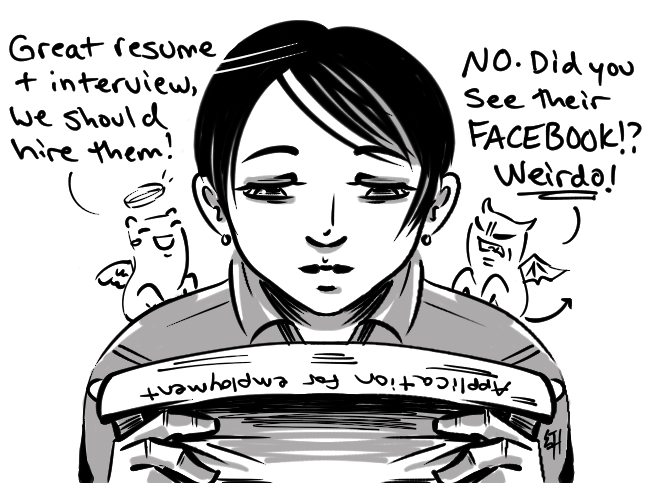As graduation approaches, graduates are occupied with finishing their theses, their internships and applying for jobs. Other than qualifications, people’s use of social media may be one of the biggest factors that plays into hiring managers’ decisions.
At the University of Illinois at Chicago, students receive online friend requests from their interviewers after going on a job interview, NPR reported last week.
Donald Kluemper, professor of Management at UIC, said this practice puts students in a tough situation. They are concerned they might not get the job if they decline the request, but they also feel compelled to disclose their profile before officially being hired.
Anti-discrimination laws prohibit employers from asking questions regarding sexual orientation, race, religion and marital status. But employers still find informal ways to learn this information about potential employees.
According to a survey conducted by the Society for Human Resource Management, 77 percent of organizations use social networking sites for recruiting, primarily as a way to attract passive job candidates. About one-third of employers explicitly said they currently use social media websites or online search engines to screen job candidates, the SHRM reported.
Despite all the laws and regulations regarding employment, employers still find ways to navigate the system to select employees they think are best for their organizations. This has two-fold implications.
For one, some organizations, in essence, pay more attention than others to private information such as religious beliefs and race that others don’t think should affect employment decisions.
These organizations might have particular requirements regarding such factors as race or sexual orientation. For example, religious-based organizations might never consider candidates of a homosexual orientation. This type of preference should be kept separate from the employment process to prevent discrimination.
The second implication of this online screening is that employers tend to discriminate against people of particular ethnic groups or sexual orientation with irrational reasons such as stereotypes or fears.
Alessandro Acquisti, professor of information technology and public policy at Carnegie Mellon University, recently conducted an experiment by setting up fake resumes for ostensibly qualified candidates. To test their employers’ preferences, the candidates revealed their religions only on their social-media profiles. The results suggested those who identified as Muslim averaged 17 percent fewer callbacks nationally than those who didn’t.
Implicit discriminations such as these are difficult to find and even harder to combat through legal processes. The Equal Employment Opportunity Commission has not issued specific regulations regarding online screening. Even if it does, the Commission will still have a hard time enforcing the rules. When dispute of such cases go to court, it’s hard for plaintiffs to prove that an employer performed a Google search on employees’ private information and even harder to prove the employer rejected them largely due to any prejudices.
That does not mean this problem is unsolvable. It is those rules and restrictions in the employment process that cloud the smooth communication between employers and candidates. If employers are free to ask any questions they want and candidates are happy to explain, employers’ concerns will be cleaned away. This freedom can pave way for a clearer communication and increase mutual understanding between both sides. Candidates should also have the right to question why employers concerned factors that are irrelevant to qualifications.
In a world with asymmetric information, “discrimination” exists regardless of any law prohibiting it. When it comes to employment, reducing mandatory restrictions might help bring down the transaction cost and make communication more efficient. Though not realistic to remove all, a deeper understanding is still the right way to lessen the degree of bigotry and bias.











